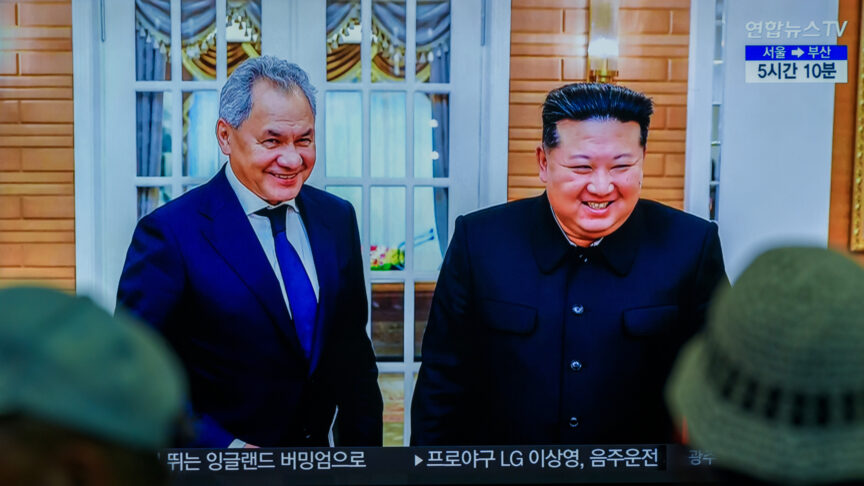Running rings around the E.U.
The authors of ECFR’s latest policy report argue that Europe must adopt a new, strategic China policy in the lead up to the EU-China Summit on 20 May
This article first appeared in the IHT on 21 April 2009.
LONDON – China’s
performance at the recent G-20 summit meeting once again showed its skill at
running diplomatic rings around Europe. Its
audacious eve-of-summit call for a new global reserve currency to replace the
dollar, the plaudits it won for a modest contribution to the International Monetary
Fund, and President Hu Jintao’s occupancy of the center-stage in the leaders’
photo-call – added up to a great public relations triumph.
But while China edges
toward the top-table, Europe’s leaders remain
disunited and unsure of how to deal with the rising giant.
As European capitals prepare for the E.U.-China summit next month –
rescheduled from last autumn after China
canceled the meeting in retaliation for President Nicolas Sarkozy’s visit with
the Dalai Lama – they must realize that the current E.U. strategy of
“engagement” at any price leaves Beijing
in control.
The E.U.’s heroic ambition for the last 20 years has been to act as a
catalyst for change in China
– as if it is still a developing country that can be molded. As a result, China now treats
the E.U. with diplomatic contempt. It sees the relationship as a game of chess,
with 27 opponents crowding the other side of the board and squabbling about
which piece to move. As the Chinese academic Pan Wei puts it, the “E.U. is
weak, politically divided and militarily non-influential. Economically, it’s a
giant, but we no longer fear it because we know that the E.U. needs China more than China needs the E.U.”
Time and again, France, Germany and Britain
have lobbied to become China’s
partner of choice in Europe – even though Beijing
only grants preferred status temporarily to the most pliant bidder. Despite the
punishments meted out to Mr. Sarkozy and Chancellor Angela Merkel of Germany for meeting the Dalai Lama, Europe’s heavyweight leaders have capitalized on one
another’s misfortune.
This jockeying for position is not working. Britain,
despite its militant advocacy for open European markets for Chinese goods, has
failed to persuade China
to open up its financial-services sector. France,
despite its commercial diplomacy, has seen its trade deficit with China explode.
And even Germany,
which has benefited the most from strong manufacturing exports, finds its trade
deficit growing as Chinese exports move up the value chain.
European companies continue to face far more barriers than Chinese companies
face in the E.U. And China
has long proved unwilling to join Western efforts on pressing problems like the
repressive regime in Burma.
Beijing does occasionally modify its position in
ways that suit the West – like its belated support for a U.N. peacekeeping
force in Sudan and ending
arms sales to Zimbabwe.
But more often than not, these changes reflect direct Chinese interests rather
than a desire to please the West.
The global economic crisis may yet persuade Beijing to cooperate for the sake of
financial stability. But it might also offer cash-rich China an
opportunity to improve its position while doing little to participate in
international rescue plans.
The E.U. has no choice but to engage China as a global partner and to
accept its historic rise. But it should drive hard bargains. Awarding China market economy status (which would put to
rest China’s fear of a
European trend toward protectionism) should be traded for genuine concessions
by China
on its own one-sided barriers to trade and investment. Access to European firms
and technologies should also be reciprocated with a new opening by China.
Beijing must
respond to European concern about issues like nuclear proliferation. Were China to contribute to successful sanctions on Iran, for
example, the Europeans might lift their arms embargo.
Though the E.U.’s leverage on China’s
human rights situation is limited, E.U. leaders must not deny one another
support in order to curry favor with Beijing.
They would be well advised to remind China that there is no restriction
of their right to meet political and religious figures – including the Dalai
Lama.
Any attempt to strengthen the European position must start with an
acknowledgment that no member state is big enough to sway China on its
own. But collectively, Europe is China’s biggest trade partner.
Whenever China
has shifted its position as a result of European pressure, as it has on the
possibility of U.N. sanctions against nuclear proliferation, this followed a
coordinated Western effort, strongly backed by the E.U. as a whole.
President Obama’s inauguration has signaled a new chapter in U.S.-China
relations. To avoid being sidelined, the E.U. will have to offer more than a
cacophonous chorus of competing voices.
served in Beijing.
François Godement is a senior French foreign policy analyst. Both men are
senior fellows at the European Council on Foreign Relations.
This article is based on ECFR’s latest policy report, A Power Audit of EU-China Relations.
The European Council on Foreign Relations does not take collective positions. ECFR publications only represent the views of their individual authors.


